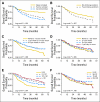Pretreatment health behaviors predict survival among patients with head and neck squamous cell carcinoma
- PMID: 19289626
- PMCID: PMC2669762
- DOI: 10.1200/JCO.2008.18.2188
Pretreatment health behaviors predict survival among patients with head and neck squamous cell carcinoma
Abstract
Purpose: Our prior work has shown that the health behaviors of head and neck cancer patients are interrelated and are associated with quality of life; however, other than smoking, the relationship between health behaviors and survival is unclear.
Patients and methods: A prospective cohort study was conducted to determine the relationship between five pretreatment health behaviors (smoking, alcohol, diet, physical activity, and sleep) and all-cause survival among 504 head and neck cancer patients.
Results: Smoking status was the strongest predictor of survival, with both current smokers (hazard ratio [HR] = 2.4; 95% CI, 1.3 to 4.4) and former smokers (HR = 2.0; 95% CI, 1.2 to 3.5) showing significant associations with poor survival. Problem drinking was associated with survival in the univariate analysis (HR = 1.4; 95% CI, 1.0 to 2.0) but lost significance when controlling for other factors. Low fruit intake was negatively associated with survival in the univariate analysis only (HR = 1.6; 95% CI, 1.1 to 2.1), whereas vegetable intake was not significant in either univariate or multivariate analyses. Although physical activity was associated with survival in the univariate analysis (HR = 0.95; 95% CI, 0.93 to 0.97), it was not significant in the multivariate model. Sleep was not significantly associated with survival in either univariate or multivariate analysis. Control variables that were also independently associated with survival in the multivariate analysis were age, education, tumor site, cancer stage, and surgical treatment.
Conclusion: Variation in selected pretreatment health behaviors (eg, smoking, fruit intake, and physical activity) in this population is associated with variation in survival.
Conflict of interest statement
Authors' disclosures of potential conflicts of interest and author contributions are found at the end of this article.
Figures

Comment in
-
Health behaviors influence cancer survival.J Clin Oncol. 2009 Apr 20;27(12):1930-2. doi: 10.1200/JCO.2008.21.3769. Epub 2009 Mar 16. J Clin Oncol. 2009. PMID: 19289610 No abstract available.
References
-
- Hoffman HT, Karnell LH, Funk GF, et al. The National Cancer Data Base report on cancer of the head and neck. Arch Otolaryngol Head Neck Surg. 1998;124:951–962. - PubMed
-
- Ries LAG, Harkins D, Krapcho M, et al. SEER Cancer Statistics Review, 1975-2003. Bethesda, MD: National Cancer Institute; 2006.
-
- Duffy SA, Terrell JE, Valenstein M, et al. Effect of smoking, alcohol, and depression on the quality of life of head and neck cancer patients. Gen Hosp Psychiatry. 2002;24:140–147. - PubMed
-
- Gritz ER, Carmack CL, de Moor C, et al. First year after head and neck cancer: Quality of life. J Clin Oncol. 1999;17:352–360. - PubMed
-
- Dikshit RP, Boffetta P, Bouchardy C, et al. Lifestyle habits as prognostic factors in survival of laryngeal and hypopharyngeal cancer: A multicentric European study. Int J Cancer. 2005;117:992–995. - PubMed
Publication types
MeSH terms
Grants and funding
LinkOut - more resources
Full Text Sources
Medical

